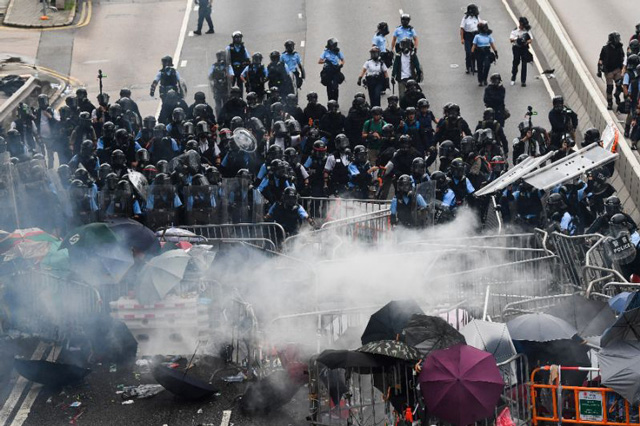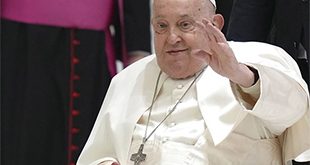
Taipei, Taiwan | AFP | Images of riot police battling protesters in Hong Kong this week have reverberated in nearby Taiwan where many recoil at what they fear could be their future if Beijing has its way.
Taiwan has been a self-ruled de facto nation in charge of its own affairs and borders for the last 70 years.
But the leaders in Beijing maintain it is part of their territory and have never given up their threat to retake it, by force if necessary.
In an attempt to persuade Taiwan’s 23 million inhabitants to consider a return to the mainland, China has touted the framework it devised with Britain to allow Hong Kong to keep its unique freedoms after the city’s 1997 handover.
The “one country, two systems” formula envisages democratic Taiwan joining the authoritarian mainland but keeping some yet to be determined privileges.
But years of sliding freedoms in Hong Kong have undermined those promises, with growing numbers of young Taiwanese now adopting an increasingly hostile view towards the Chinese mainland and a staunchly independent identity.
The unrest in Hong Kong this week has only fanned those suspicions.
“Developments in Hong Kong from the Umbrella Movement to the recent protests, have cemented the view of people in Taiwan that the PRC can’t be trusted to preserve their autonomy,” Bonnie Glaser, a Taiwan expert at the Center for Strategic and International Studies, told AFP, referring to the 2014 pro-democracy protests in Hong Kong that failed to win any concessions from Beijing.
– ‘One country, one system’ –
Taiwan heads to the polls in January to elect a new president in a contest set to be dominated by relations with China.
President Tsai Ing-wen, who is seeking a second term and hails from a Beijing-sceptical party, has repeatedly referred to the clashes in Hong Kong this week as a wake-up call.
Calling the election a “fight for freedom and democracy” she said one country, two systems “can never be accepted in democratic Taiwan”.
“The protests in Hong Kong make Taiwanese people cherish more our democratic system and way of life,” she said Thursday.
Even her political opponents, who favour much warmer ties with China, have spoken in a similar vein.
Potential rival Terry Gou, the billionaire Foxconn boss who is seeking to run as the Beijing-friendly Kuomintang’s presidential candidate, called the model “a failure” this week.
“If I become president I will open both arms to invite Hong Kong friends to emigrate to Taiwan because the Republic of China has a free and democratic environment,” Gou said in a Facebook post, using Taiwan’s formal name.
Taiwanese social media has been filled with messages of concern about what a Beijing-ruled future might hold.
“Hong Kong has already proven to us that there is only ‘one country, one system’,” one comment on social media read. “If we vote for a pro-China party in 2020, Taiwan will become Hong Kong”.
– ‘Hegemonic China’ –
Beijing cut communication with Tsai’s government following her 2016 election, ramping up military drills and poaching several diplomatic allies because she refuses to acknowledge that the self-ruled island is part of “one China”.
With China keen to ensure Tsai is defeated in January, the renewed political crisis in Hong Kong is bad timing.
This week the South China Morning Post ran a report suggesting Chinese officials were angry the Hong Kong extradition bill had given fuel to Tsai.
“Taiwan is involved,” the paper quoted what it said was a core pro-Beijing figure close to China’s liaison office in Hong Kong.
“A presidential election is coming and (the legislation) is like sending ammunition to the Democratic Progressive Party,” the source added, referring to Tsai’s party.
It was the murder of a Hong Kong woman at the hands of her boyfriend while they were on holiday in Taiwan last year that promoted Hong Kong authorities to call for an extradition law.
But Taiwan has become so concerned about its own citizens getting extradited to the Chinese mainland if they pass through Hong Kong that it has publicly said it will not seek the murder suspect’s return if the bill goes ahead in its current form.
Taiwanese rights and student groups are planning to stage rallies over the weekend to support the Hong Kong protests.
Lin Fei-fan, a leading activist in Taiwan’s 2014 Sunflower Movement opposing a controversial China trade pact, described the extradition bill as an example of how Beijing presented a current threat to his fellow citizens, not a future one.
“Today’s Hong Kong is also today’s Taiwan,” he told a crowd protesting outside Hong Kong’s trade office in Taipei this week.
“We both face the expansion of a hegemonic China and we are on the frontline of defence.”
 The Independent Uganda: You get the Truth we Pay the Price
The Independent Uganda: You get the Truth we Pay the Price


